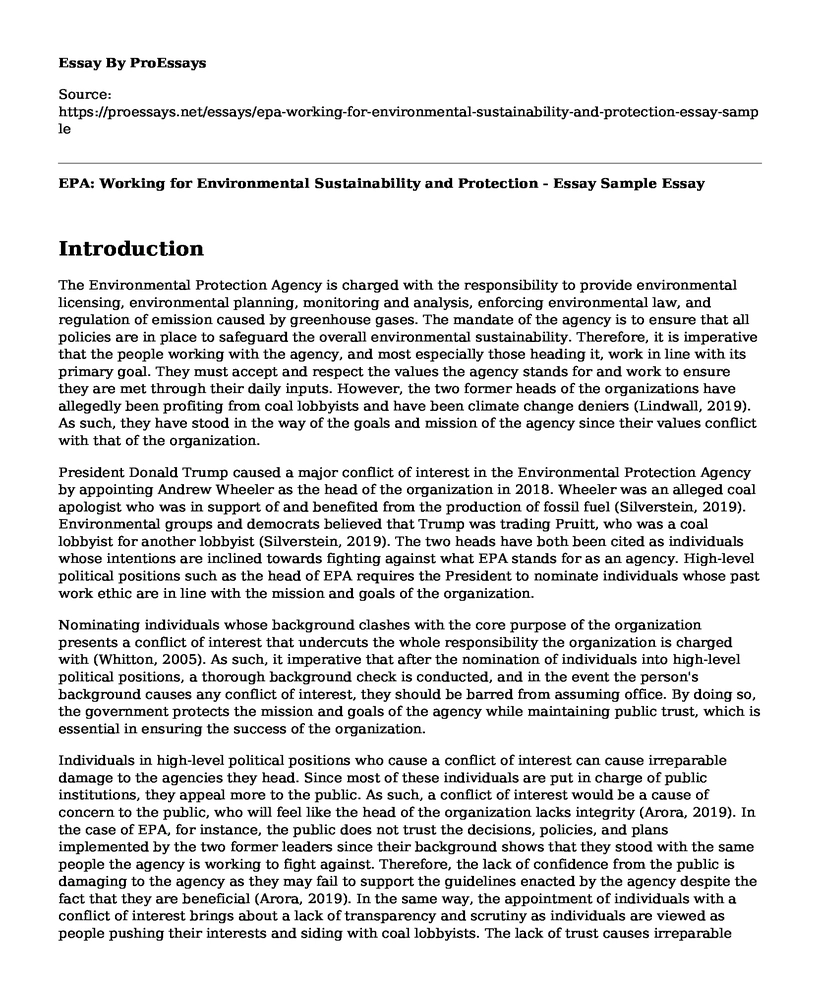Introduction
The Environmental Protection Agency is charged with the responsibility to provide environmental licensing, environmental planning, monitoring and analysis, enforcing environmental law, and regulation of emission caused by greenhouse gases. The mandate of the agency is to ensure that all policies are in place to safeguard the overall environmental sustainability. Therefore, it is imperative that the people working with the agency, and most especially those heading it, work in line with its primary goal. They must accept and respect the values the agency stands for and work to ensure they are met through their daily inputs. However, the two former heads of the organizations have allegedly been profiting from coal lobbyists and have been climate change deniers (Lindwall, 2019). As such, they have stood in the way of the goals and mission of the agency since their values conflict with that of the organization.
President Donald Trump caused a major conflict of interest in the Environmental Protection Agency by appointing Andrew Wheeler as the head of the organization in 2018. Wheeler was an alleged coal apologist who was in support of and benefited from the production of fossil fuel (Silverstein, 2019). Environmental groups and democrats believed that Trump was trading Pruitt, who was a coal lobbyist for another lobbyist (Silverstein, 2019). The two heads have both been cited as individuals whose intentions are inclined towards fighting against what EPA stands for as an agency. High-level political positions such as the head of EPA requires the President to nominate individuals whose past work ethic are in line with the mission and goals of the organization.
Nominating individuals whose background clashes with the core purpose of the organization presents a conflict of interest that undercuts the whole responsibility the organization is charged with (Whitton, 2005). As such, it imperative that after the nomination of individuals into high-level political positions, a thorough background check is conducted, and in the event the person's background causes any conflict of interest, they should be barred from assuming office. By doing so, the government protects the mission and goals of the agency while maintaining public trust, which is essential in ensuring the success of the organization.
Individuals in high-level political positions who cause a conflict of interest can cause irreparable damage to the agencies they head. Since most of these individuals are put in charge of public institutions, they appeal more to the public. As such, a conflict of interest would be a cause of concern to the public, who will feel like the head of the organization lacks integrity (Arora, 2019). In the case of EPA, for instance, the public does not trust the decisions, policies, and plans implemented by the two former leaders since their background shows that they stood with the same people the agency is working to fight against. Therefore, the lack of confidence from the public is damaging to the agency as they may fail to support the guidelines enacted by the agency despite the fact that they are beneficial (Arora, 2019). In the same way, the appointment of individuals with a conflict of interest brings about a lack of transparency and scrutiny as individuals are viewed as people pushing their interests and siding with coal lobbyists. The lack of trust causes irreparable damages that affect the way the agency functions.
Conflict of interests must be managed when it comes to the appointment of high-level political positions. The individual's background should be considered to ensure it is in line with that of the organization of appointment. Failure to follow due diligence, irreparable damage will be done, and the public will lose faith in the organization or agency.
References
Arora, M. (2018). Conflict of interest (COI) and governance in the era of sustainable development goals. European Journal of Public Health, 28(suppl_4), cky213-293.
Lindwall, C. (2019, June 19). Three Former Republican EPA Administrators Are Sounding the Alarm. Retrieved from https://www.nrdc.org/stories/three-former-republican-epa-administrators-are-sounding-alarm
Silverstein, K. (2019, March 2). Can A Coal Lobbyist Confirmed To Head EPA Be Trusted To Safeguard The Public's Interest? Retrieved from https://www.forbes.com/sites/kensilverstein/2019/03/01/can-a-coal-lobbyist-confirmed-to-head-epa-be-trusted-to-safeguard-the-publics-interest/#4f7fd7d34840
Whitton, H., & Bertok, J. (2005). Managing conflict of interest in the public sector: a toolkit. OECD Publishing.
Cite this page
EPA: Working for Environmental Sustainability and Protection - Essay Sample. (2023, Feb 27). Retrieved from https://proessays.net/essays/epa-working-for-environmental-sustainability-and-protection-essay-sample
If you are the original author of this essay and no longer wish to have it published on the ProEssays website, please click below to request its removal:
- A Discussion on the Bhopal Disaster Essay Example
- Essay on Evidence of Global Warming
- Essay Example on Climate Change: Causes, Impacts, & Solutions
- Essay Sample on Humans' Impact on Global Warming: Facts and Consequences
- Research Paper on Clean Water: A Precious Resource for Human Survival
- Lake Victoria's 110,000-Year Climate and Biodiversity Changes - Essay Sample
- Paper Example: Ensuring Risk Mitigation During Earthquakes in Sentinel City







